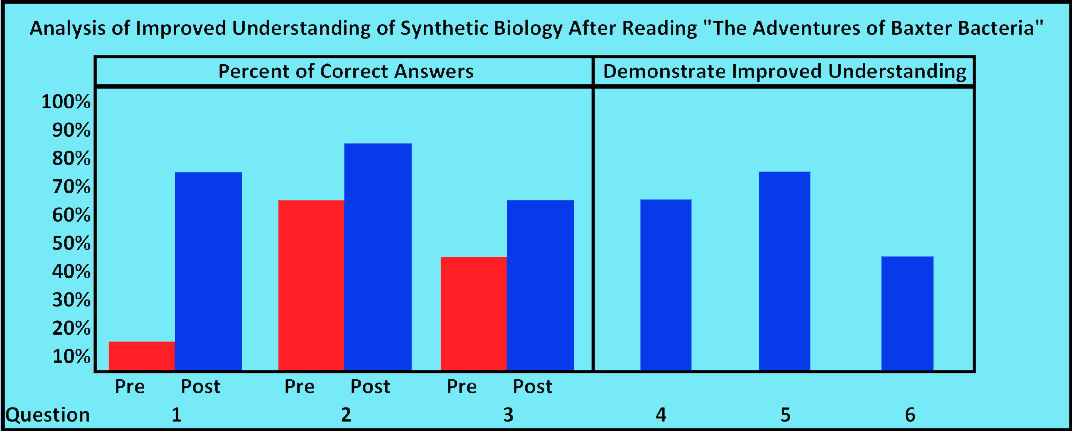Team:BYU Provo/Outreach/Baxtor
From 2013.igem.org
| Line 109: | Line 109: | ||
<br> | <br> | ||
| - | ==Evaluation of the Efficacy of Our Outreach | + | ==Evaluation of the Efficacy of Our Outreach Project As a Learning Tool== |
We wanted to test our book's ability to improve the public's understanding and appreciation of synthetic biology. We created a test meant to be taken before and after reading The Adventures of Baxter Bacteria and the Parental Guide that we included at the end of our book. We met with a professional in the field of Biology Science Education, Dr. Jamie Jensen, who helped us create questions that would quantitatively measure an individuals understanding of synthetic biology. We then administered the pre and post tests to children ages 6-11 to test for understanding. The results to the individual questions are depicted below. | We wanted to test our book's ability to improve the public's understanding and appreciation of synthetic biology. We created a test meant to be taken before and after reading The Adventures of Baxter Bacteria and the Parental Guide that we included at the end of our book. We met with a professional in the field of Biology Science Education, Dr. Jamie Jensen, who helped us create questions that would quantitatively measure an individuals understanding of synthetic biology. We then administered the pre and post tests to children ages 6-11 to test for understanding. The results to the individual questions are depicted below. | ||
Revision as of 19:27, 27 September 2013
| ||
|
|
OverviewOne of our main goals was to create a lasting impact on society's perception of synthetic biology. What better way to influence children and adults than publishing a book? The Adventure of Baxter Bacteria teaches young children about the potential of synthetic biology in a fun and creative story. The narrative recounts the wonderful journey of Baxter Bacteria and his pet plasmid, Vector, as they travel through the world facing many challenges. Included at the end of the book is a parental guide designed for parents to not only teach their children about synthetic biology but themselves as well. Terms such as plasmid, bacteria, and virus are all explained making the book a powerful learning tool for all ages. What happens to Baxter and Vector in their big adventure? You will have to read it for yourself to find out! And it rhymes :)
Different EditionsThe first edition of The Adventure of Baxter Bacteria was shared with kids during our library visit. Click here to find out more. The following is the final/published edition of The Adventure of Baxter Bacteria, with minor modifications to make visualization suitable for the wiki. It contains a parental guide and a subsequent quiz toward the end of the book for parents to share with their children. Please click on Next Page or Previous Page to flip through the book.

----------------------Previous Page---------------------- ----------------------Next Page----------------------
Evaluation of the Efficacy of Our Outreach Project As a Learning ToolWe wanted to test our book's ability to improve the public's understanding and appreciation of synthetic biology. We created a test meant to be taken before and after reading The Adventures of Baxter Bacteria and the Parental Guide that we included at the end of our book. We met with a professional in the field of Biology Science Education, Dr. Jamie Jensen, who helped us create questions that would quantitatively measure an individuals understanding of synthetic biology. We then administered the pre and post tests to children ages 6-11 to test for understanding. The results to the individual questions are depicted below. As is clear by the above data, our book is an effective method of increasing the public's understanding of synthetic biology. Every individual who participated in our study scored higher on the post test. Questions 1-3 were multiple choice and were structured to test basic knowledge of biology and biological processes. Questions 4-6 tested people's perception of synthetic biology and also their ability to apply principles of synthetic biology to real world situations. We graded questions 4-6 using a rubric with a number system as a measurement of understanding. We gained permission from the IRB before conducting the tests used to gather this data. | |
 "
"
